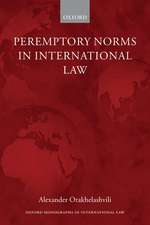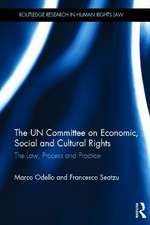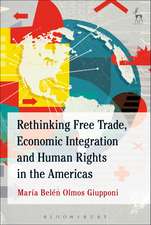Self-Determination, Statehood, and the Law of Negotiation: The Case of Palestine
Autor Dr Robert P. Barnidge, Jr.en Limba Engleză Hardback – 27 ian 2016
| Toate formatele și edițiile | Preț | Express |
|---|---|---|
| Paperback (1) | 252.01 lei 6-8 săpt. | |
| Bloomsbury Publishing – 25 apr 2018 | 252.01 lei 6-8 săpt. | |
| Hardback (1) | 541.20 lei 6-8 săpt. | |
| Bloomsbury Publishing – 27 ian 2016 | 541.20 lei 6-8 săpt. |
Preț: 541.20 lei
Preț vechi: 774.49 lei
-30% Nou
Puncte Express: 812
Preț estimativ în valută:
103.58€ • 107.85$ • 87.53£
103.58€ • 107.85$ • 87.53£
Carte tipărită la comandă
Livrare economică 10-24 martie
Preluare comenzi: 021 569.72.76
Specificații
ISBN-13: 9781849468121
ISBN-10: 1849468125
Pagini: 264
Dimensiuni: 156 x 234 x 25 mm
Greutate: 0.59 kg
Editura: Bloomsbury Publishing
Colecția Hart Publishing
Locul publicării:London, United Kingdom
ISBN-10: 1849468125
Pagini: 264
Dimensiuni: 156 x 234 x 25 mm
Greutate: 0.59 kg
Editura: Bloomsbury Publishing
Colecția Hart Publishing
Locul publicării:London, United Kingdom
Caracteristici
This book seeks to advance our understanding of the international law of negotiation and use this as a framework for assessing the Israeli-Palestinian dispute.
Notă biografică
Robert P Barnidge, Jr, is Lecturer and Coordinator of International Relations in the Department of History, Politics, and International Relations at Webster University.
Cuprins
1. Introduction 2. The Evolution of Palestinian Arab Proto-Self-Determination and "Peoplehood" During the Mandate for Palestine 3. From Disparate Means of Dispute Settlement to the Introduction of a Negotiation Imperative: 1948 - 1973 4. The Emergence of Palestinian International Legal Personality and the Bilateral Negotiation Imperative: 1973 to Oslo 5. The International Law of Negotiation as a Means of Dispute Settlement 6. The International Law of Negotiation and Palestinian Applications for Admission to the United Nations: Sword or Shield? 7. Conclusion
Recenzii
(...) It is clear that among the important reference books, classroom textbooks and journalistic resources, Barnidge's book will be near the top of the list.
The book can be an important source for those who want to look at the Palestine statehood issue from an Israeli standpoint. It is equally important for those pursuing Palestine cause to scholarly engage with these views.
Barnidge's book brings the law of negotiation to life with a wealth of supplementary materials and supportive case law, making it an invaluable resource for anyone with an interest in either the law of negotiation or the conflict between Israel and the Palestinians.
This is an erudite and carefully researched work by an expert in international law addressing a neglected aspect of the Israeli-Palestinian conflict...Since 1988, Palestinians have repeatedly sought to tarnish Israel's standing by accusing it of violating international law. Barnidge's excellent book shows that Israel's defenders are not entirely without resources as they seek to counter these attacks.
... this book gives an excellent account of the negotiation process for an international settlement of the Palestine question from its very beginnings to the present ... This monograph gives a wonderful insight into the nature and the legal consequence of international negotiations, an aspect so far only marginally treated in international law literature ... All in all a highly interesting book that fills an important gap in otherwise very broad literature on an internationally intensively commented subject.
Barnidge's book should be on the bookshelf of every reader who follows legal issues in the Middle East.
Robert Barnidge's important book seeks to persuade us to view the Palestinian-Israeli conflict through the prism of what he calls the 'law of negotiation.' The volume offers an analysis of the conflict through a rigorous application of international legal sources from the British Mandate to the present day and is a major contribution to the analysis of the role of international law in the conflict.
The author, a professor of international law, traces and assesses the legal history of the conflict from the era of the British Mandate for Palestine to the present day in this well-written, convincing and accessible work.
The book can be an important source for those who want to look at the Palestine statehood issue from an Israeli standpoint. It is equally important for those pursuing Palestine cause to scholarly engage with these views.
Barnidge's book brings the law of negotiation to life with a wealth of supplementary materials and supportive case law, making it an invaluable resource for anyone with an interest in either the law of negotiation or the conflict between Israel and the Palestinians.
This is an erudite and carefully researched work by an expert in international law addressing a neglected aspect of the Israeli-Palestinian conflict...Since 1988, Palestinians have repeatedly sought to tarnish Israel's standing by accusing it of violating international law. Barnidge's excellent book shows that Israel's defenders are not entirely without resources as they seek to counter these attacks.
... this book gives an excellent account of the negotiation process for an international settlement of the Palestine question from its very beginnings to the present ... This monograph gives a wonderful insight into the nature and the legal consequence of international negotiations, an aspect so far only marginally treated in international law literature ... All in all a highly interesting book that fills an important gap in otherwise very broad literature on an internationally intensively commented subject.
Barnidge's book should be on the bookshelf of every reader who follows legal issues in the Middle East.
Robert Barnidge's important book seeks to persuade us to view the Palestinian-Israeli conflict through the prism of what he calls the 'law of negotiation.' The volume offers an analysis of the conflict through a rigorous application of international legal sources from the British Mandate to the present day and is a major contribution to the analysis of the role of international law in the conflict.
The author, a professor of international law, traces and assesses the legal history of the conflict from the era of the British Mandate for Palestine to the present day in this well-written, convincing and accessible work.


















